# Summary
A major questionnaire was received from a self-described conservative in Sooke. Here are Nick's answers/thoughts on much of it.
It raises some interesting questions, but some of it has what I would describe as extremely slanted questions and both spoken and unspoken assumptions that make answering challenging. It actually brings up something I was discussing with a friend after they sent me a very vague question. To get a "good answer" from a politician questions should be as neutral as possible or the answer is easy to slant - that's especially true verbally rather than written down because you can't slant multiple ways as much if it is public record.
For example, if you ask "what are you going to do about the problem of pride flags" I know what you want to hear, versus if you ask "I wanted to know your thoughts on the pride flags around Sooke?" I don't know what you want to hear, and cannot temporize, or limit negatives unless I answer in a very vague and unsatisfactory way. So a good question forces the candidate in to either a very good answer that is true to what they believe or a very obvious nothing answer.
For the record my answer to that question was:
"Absolutely in favour of pride flags during June. Personally I'd switch to Canada Flags for something on the line of the first 2 weeks of July not just July 1st. Despite historical blemishes (to put it gently) and current failings, I freaking love this country. More than it deserves some would say but I've always felt love where you are and try to build up the good is better than focusing on the negatives most of the time."
That question/answer actually goes strongly against one of the questions in this questionnaire, but no matter. I will speak what I believe. Votes should be because you support me and accept that you don't agree with all things but can align with enough of my stances to be happy with your choice. 100% alignment is rare and we don't need political orthodoxy - we need people who say what they mean and mean what they say. Take a stand, make a choice even if it loses votes because freedom of speech, honesty and transparency is more important than being elected.
# Questionnaire
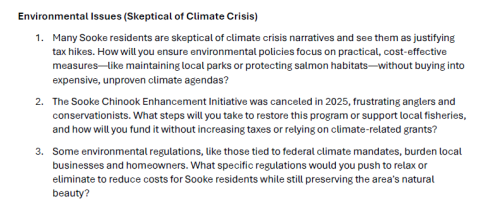
Environment Issues
I’m not going to debate climate crisis but in many ways I see it as not the point. Weather forecasting despite all the improvements in technology still has significant fuzz or guess factor. Look at any forecast hurricane track vs the final. Are humans impacting climate? Yes. Can we perfectly predict impacts? No. Setting aside global scale issues, Sooke has in most areas shallow soil and significant invasive species (broom) with high fire risk. I would much prefer to focus on actions – it doesn’t matter whether a hot summer day is a normal variation or climate change, shade trees make things better. Heavy rain? We should be building swales and permeable surfaces to absorb water and maintain our water table versus channeling it out to sea as fast as possible.
- Prioritizing new park acquisitions (through development permit concessions particularly) along water ways including seasonal streams and depressions. Trees and especially native plants along riparian areas is critical for stream and fish health.
- Not using all available grants for ideological reasons if they can achieve local goals is to my mind foolish. I would absolutely support using any climate related grants for supporting fish stocks.
- Building “step codes” are a provincial issue not federal. Beyond that – which only affects new/significantly new build construction – the impact of federal climate mandates are significantly not on a local level. Given the (unfortunate) lack of light industry and minimal commercial space in Sooke, I can’t think of any specific regulations in this area that are worth the very minimal lobbying power of Sooke to attempt to change versus lobbying for infrastructure work/dollars.
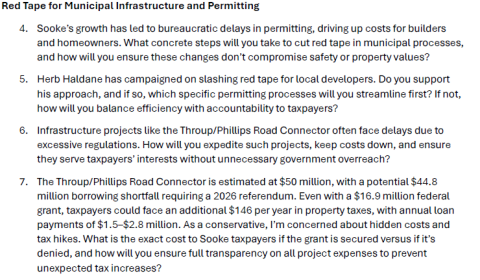
Red Tape for Municipal Infrastructure and Permitting
Quite a few different topics here and some very broad questions. Anyone with construction experience can definitely agree that timelines – especially uncertainty in timelines is a major challenge.
- Definitely have mentioned this elsewhere, but an important step is to apply pre-emptive zoning in bulk. Rezoning is generally a months long process using both developer/property owner money and significant staff time, and sometimes council time. In areas that we’ve identified are good targets for higher density or commercial – specifically using the OCP (which desperately needs to be finalized) – we should be getting the zoning done so depending on the project it needs development permits and building permits, but not the rezoning process. This does not impact safety since all the engineering steps of development and building permits are still in place. Some property values could be impacted but mostly to make the areas that are pre-zoned valued higher – although that is in the hands of BC Assessment not Sooke. That could have negative impact of higher taxes for people that don’t want to develop their lands in those areas but the positives I believe outweigh that. The reduction of workload related to this should allow better time lines for all other stages of permitting.
- I have certainly heard him talk about reducing red tape. I haven’t heard him reference specific detailed changes so wouldn’t want to commit to exactly supporting his approach. But, yes, I strongly support making less steps required to do anything that is supported in the OCP and other official planning documents. Reduced re-zoning proposals is my first and easiest action. If we can reduce re-zoning proposals by 50% think about all the staff time that can be available for better communication and more efficiency on all the other steps and rezoning proposals in other areas of Sooke.
- Most large infrastructure projects require either significant funding from other jurisdictions and/or borrowing. Referendums that are done within the context of a general election (or by-election) are effectively close to free, additionally, an approved referendum does not bind council to borrowing – it gives council the flexibility to borrow if necessary. We should be having referendums/ballot initiatives for multiple major infrastructure projects that are being looked at every with general election. Like not just look at Throup. Look at sewer expansion in different areas. This would allow council and staff to immediately jump on federal or provincial funding opportunities rather than have to wait until the next election or have a standalone referendum (estimated at $30-40k).
- Boards and councils can be either “working” or “advisory”. Officially, Sooke’s council is advisory – makes decisions but day to day business type activities are handled by staff and/or contracted out. Council does not do the estimating and research for major processes. That said, my experience with construction and accounting does allow me to read estimates with knowledge instead of as a total neophyte. But I can’t answer the exact cost for a project that is not even going to be potentially started for at least 18 months assuming the referendum passes in 2026. It is critical that staff prepares a very fullsome accounting of estimates in advance of the referendum in 2026 so that we can vote with knowledge on that question at the time.
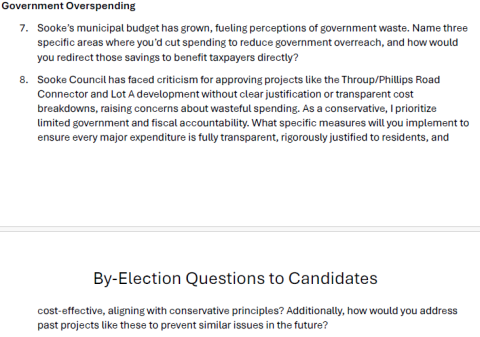
Government Overspending
** All questions after this are mis-numbered in the provided PDF of questions. I’m assuming the intent was the number should continue incrementing at 1 each.**
There are some assumptions here that I take issue with. Absolutely I can agree that budget growth can fuel perceptions of waste, but translating that into government overreach, seems like a stretch (or ahem... overreach).
- Not to be repetitious, but preemptive zoning. The saving in staff time will allow more efficiency and reduce the pressures to hire more staff. Beyond that, and with Sooke still the lowest or second lowest tax rate on southern Vancouver Island, I do not think that most costs are related to governmental overreach – everyone has different opinions of what the correct level of government reach is. I’d ask what bylaws do you feel are overreach?
- The Throup/Phillips road connector has not been approved. Therefore this question feels somewhat base on misunderstanding. But, ignoring that example, I absolutely agree that fiscal accountability and transparency is critical for effective government. Earlier this year at a public council meeting, I provided feedback and suggestions about Councillor St Pierre’s motion to introduce a motion to UBCM about Freedom of Information. I – and many others – had major qualms about the impact of that motion, personally particularly the idea of limiting the number of active requests to one. St Pierre follow my exact suggestion of how to improve the motion and re-introduced it at the next meeting. Unfortunately resident engagement – at least measured by number of people at the average council meeting is not high. We need to work hard to communicate better exactly what decisions and the impact on residents and property owners this has – both the good and the bad. The biggest thing here to me is ensuring more clear information is shared with summaries – not just the hundreds of pages of council meeting agenda but useful readable information for a 5 minute read not a 5 hr read. Summaries let more people engage with knowledge and seek the detailed clarifications in the full packages for the items that they are specifically interested in.
- I strongly think that the ECOMM costs should be covered by the province. Sooke is not alone in this fight but is in most cases on the weak end of the decision. I am willing to engage legal counsel for fighting any provincial change when there seems a chance of winning after a fullsome legal review. But even if fighting a provincial cost download like that, in the short term it is crucial to collect the tax money for that so that it is not an emergency cost if lost – if won, it can reduce municipal debt. Given both federal and provincial push about density requirements I do not think that is a fight worth fighting hard on. Policing also unlikely to achieve success. E-COMM definitely some possibilities here and worth challenging I believe.
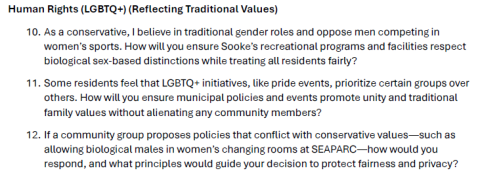
Human Rights (LGBTQ+) (Reflecting Traditional Values)
Firstly I absolutely support LGBTQ rights. That said, I walked in the Sooke pride pet parade, attended the after party. I also as most years walked in the Victoria Pride Parade. On a personal level I do actually significantly match the somewhat ahistorical but much lauded traditional values. I married the first person I asked out – who I met at the Shirley Community Hall - I was homeschooled, milked goats growing up. I am the primary breadwinner in my family. Place a high value in respect. However, I place a higher value on personal freedom than on conformity and I absolutely support historically marginalized communities.
- Except in tournaments I’ve always played co-ed in all my sports – partially due to being homeschooled and then distanced ed through SIDES for my dogwood. Unless we are talking about international level I do no think this is worth any discussion. Sooke as a district does not run any recreational programs that could in any way be impacted.
- Sooke does not run any pride events. Sooke does support pride events as requested by community members/organizations – and I support this. Sooke also supports various other community events as requested by event organizers. If you feel there is a specific event this community needs I encourage you to start organizing it and present a request at the appropriate time/venue to council/staff for support – for example, we could have bigger/more VE Day activities in Sooke instead of most people going to Esquimalt. I doubt there is any event that Sooke can support that won’t be disliked by some people or will fill all needs, the best solution is to support many events that are not exclusionary (and to be clear, pride is not exclusionary).
- SEAPARC is separate from Sooke council (although board of directors has two representatives from Sooke council – currently councillor Al Beddows and mayor Maja Tait). Given that SEAPARC also already has gender neutral change rooms I both hope and believe that this will not become a problem.
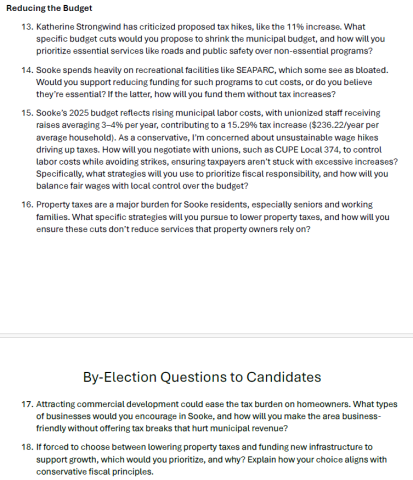
Reducing the budget
- The current tax increase rate is hard to bear and very easy to criticize. That said, it is partially the fault of previous councils and lack of long term planning. For example 2012 to 2016 the total tax increase was 2.24% with 2 years at 0. 2012’s tax increase of 0% with an inflation of 1.5% was short sighted. Tax increases should be be close to inflation rates unless we expect massive cost savings or are funding a major infrastructure initiative. That would ensure that we have reserves for infrastructure initiatives with less or no borrowing – or for unreasonable downloads from the province such as the ECOMM/911 costs. Predictability is very important. The current budget does not have significant movement possibilities unfortunately, sewer and protective services (police/fire/bylaw) is roughly half of our budget. The 3 shifts for fire and 24/7 policing model I believe to be important even though they are increasing costs.
I don’t believe reducing the municipal budget is a realistic goal – especially since I’m talking about expansion of sewer area and capital infrastructure. Additionally, population growth necessitates more staff particularly in police and fire to maintain the same service level. It is more important to be realistic than to make unachievable promises – or reduce services. - Recreation and fitness is critical. Sports are one of the best ways to build confidence, respect and teamwork in youth. SEAPARC is crucial for that. Senior fitness is an important factor in healthy aging and long life. It also provides a venue for many of our money drawing festivals such as the Sooke Fine Arts. Giving youth activities that are accessible and at the end user level cheap or free provides cost and societal savings in terms of reducing delinquency. Ongoing fitness has dramatic cost savings for society and individuals – mostly not realized by the municipality, but a lot by the province for medical care. This is an item I would support tax increases if they became necessary.
- Inflation in Canada in 2024 was approximately 2.4%, 2023 3.9%. Given those numbers a 3-4% raise is basically maintaining purchasing power. I do not think that is an excessive increase. It the number was 5-10% raise, I’d have problems with it. As is I believe that is appropriate and no changes are necessary.
I do not believe it is at all feasible to reduce property taxes at this time. There are multiple long term ‘ifs’ that could theoretically allow it:
- If we get enough of an increase in commercial (and light industrial) but that wouldn’t be possible within the next 8 months – 20 months? Big maybe but unlikely.
- If an alternative funding model is achieved for ECOMM – whether provincial or as part of utility bills. This could be in time for next tax season but more likely 2027 tax season.
More realistic, is to work to keep tax increases to be close to inflation. Even if those theoreticals came through I would be much more interested in a few years of below inflation increases rather than a out and out decrease and to use that money for infrastructure/reduce borrowing/paying down debt faster.
- Pre-emptive zoning will make all developments including commercial spaces quicker and cheaper to build. That is the first and biggest thing we can do to achieve that with positive fiscal impacts rather than negative. I would encourage any business that wants to try – personal preference would be many small business but I’m quite open to any commercial – and I believe that except where health and safety is at stake, council/bylaws on specific types of business are more often then not overreach.
- That is a big “depends” question. Almost any infrastructure could be claimed to support growth but the timing may not be right. Like Throup to Phillips connector 20 years ago was not the right time – not enough population or traffic. But if we had done it 10 years ago, the amount of money and tax to do it would’ve been a less than if we do it in 2027+. So choosing the right time will cause the least per parcel tax increases. So it is entirely dependent on a fullsome analysis of each and every proposed major infrastructure project.
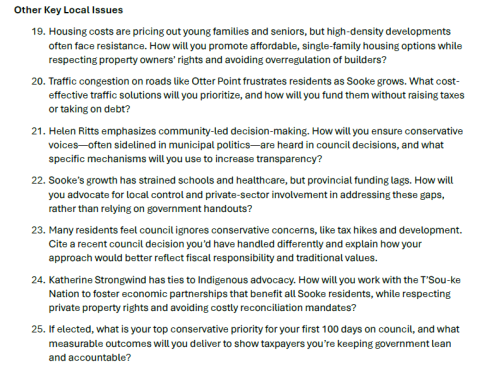
Other Key Local Issues
- Pre-emptive zoning is the first and easiest answer for many of our challenges. Additionally we do need to reduce DCCs to achieve more affordable housing.
- Most of the proposed traffic “solutions” focus on getting traffic off of Highway 14 sooner. That will lead to more traffic issues on alternative routes including Charters, Otter Point, Throup, Church, Grant, Wadams etc. Working with the province and school district to have less school traffic/more bussing and alternative transportation to school is one of the only things that we can do that will not require significant cost.
- Conservative voices are some of the most heard at council meetings from folks such as Ellen Lewers and Veronica Pemberton. I’m always surprised if I don’t see Ellen at a council meeting and she is a frequent speaker. It is definitely council’s job to ensure that there is opportunity for the community to speak and that summaries are provided to allow at least partial understanding without reading a multiple-hundred page document every week. I’ve frequently felt the current single in person public speaking chance at most council meeting is not the most accessible. I believe that with verification instead of just streaming our meetings we should allow online speaking. Also need more low official/freeform discussion availability to need to be prioritized by councillors – I certainly would. After those changes, the primary responsibility to speak at events and reach out to candidates and councillors would be with the residents.
- Colwood and Langford have recently done some good doctor availability improvements. I do not think that Sooke’s budget is enough for this unless we accept frankly excessive tax increases that I couldn’t support. These are long standing and are not going to be resolved in the next 16 months before the general election.
- This by-election is a fantastic example of something I would’ve handled differently – although it was a close to unanimous vote as is often the case in Sooke council meetings so one vote wouldn’t have changed anything there. One more voice might’ve convinced people though. This by-election should’ve have either been done at the first opportunity – late January/early February – or staff should’ve been instructed to prioritize preparation of the referendum for Throup/Phillips connector. As it is, if the election had been done earlier, whoever get elected could’ve been on council for almost 6 months more and we wouldn’t have had quorum issues in the federal election due to Mayor Tait taking her leave of absence. If later, having the referendum now vs in 2027 would allow us to make more informed choices and decide whether that is an appropriate cost or not. Uncertainty should be reduced as much as possible.
- Sooke council already has a good co-operative relationship. One of the benefits of the by-election is I can get involved in that. One complexity is that the T’Sou-ke reserves vote for CRD/Juan de Fuca director rather than integrated governmentally with Sooke. That said, yes, I strongly support partnership on all things we can.
- This question is in some ways foundationally impossible unless it is things that are no immediate result - like reviewing documents (all councillors should be doing so regularly). We’re not talking about a party situation where if elected there would be significant power. We’re talking about 1 councillor being added to 5 councillors and 1 mayor. That’s not a lot of power/ability to promise thing. Additionally, there are no council meetings in August so that 100 days is 1/3 done on holiday.
I’m extremely adverse to making impossibles promises – do my best to achieve what I’ve talked about yes, but promise things I can’t? Absolutely not.
The promises that can be made is to listen. To be available for discussion. To work towards things. But there is no ability to guarantee that any of the motions that the new councillor may make will pass. That said, my first priority upon election – aside from all the administrative stuff like being sworn in is to get the OCP moving. It is our primary level of local control over what development happens where.